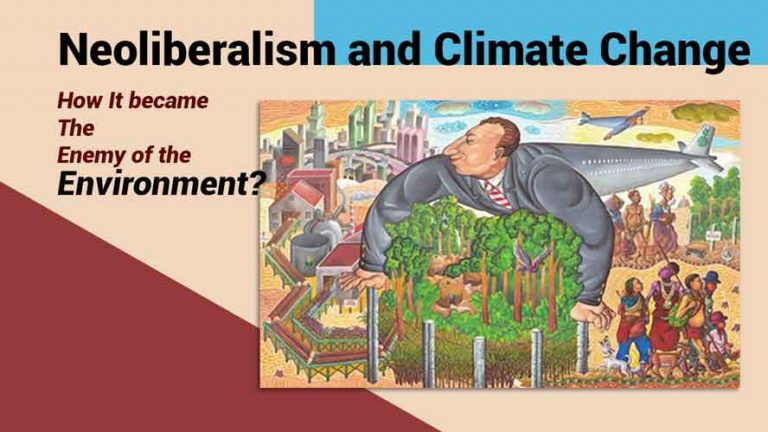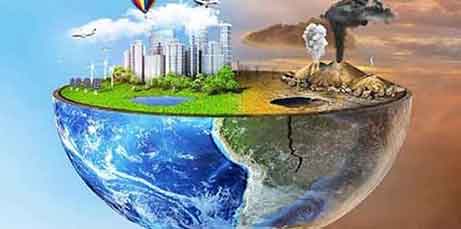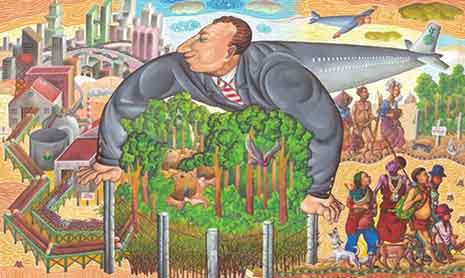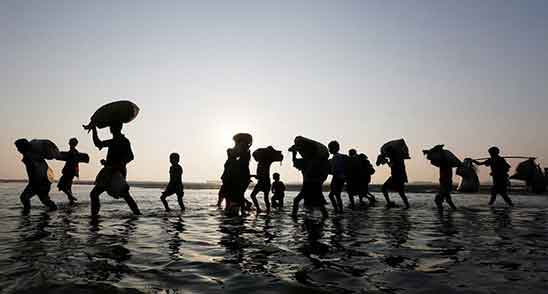
Neoliberalism and climate change are connected; actually, they make vice versa relationship, which isn’t good enough. How slowly Neoliberalism climate change become the enemy of the environment?
In this write-up, I open the discussion about How climate issues became mere business deals with this Neoliberalism dogma and how it’s manipulating the climate issues.
Politicians often say that nothing is more valuable than liberty. But in the name of freedom, many things are being taken away from the people of the world. Nature is one of them. In the late 70s, a new political, economic doctrine named Neoliberalism was brought out by the world leaders. In this Neoliberalism, government and public actions were made limited to the betterment of the big corporations and businesses. Sometimes it sounds good, but it has hazardous sequences. In the public sphere, big companies began to interfere in the climate sector. These corporations don’t care about the globe and its environment. Sometimes, research and scientific explorations are also manipulated for using the limited resources of nature again and again. As a result, climate change has become a harsh reality in the present era. The ordinary people are blamed for the current pollution situation. But the whole picture is made by several phenomena, and Neoliberalism is one of them. As a doctrine, it promotes rugged individualism, and its style of argument ignores social processes. Only individuals can make the earth greener. Joint activities of human society can bring productive output.
To make the planet better again, humankind must get rid of profit-centric approaches and sheer individual betterment.
Let’s deep dive into the article and explore how climate issues became mere business deals in this phenomenon.
How Neoliberalism Began :

‘Neoliberalism’ is perhaps the most praised and most condemned term in international politics and economy. It’s fascinating that this single word defines many ideas, not a single one.
Suppose we define Neoliberalism as an international policy based on a free market. In that case, its journey began in the 1980s.
But the idea is not that new. As a commonly used term, it became popular in the 1930s in the UK and the USA.
In the mid of the 20th century, it was similar to some revival of 19th-century economic liberalism.
In the ’80s, the term became a synonym for freeing trade, removing barriers from big business’, cutting taxes from big corporations, privatizing industries, shortening subsidies from agriculture, loosen business law, and so on.
US President Ronald Regan and British prime minister Margaret Thatcher were two world promoters of Neoliberalism. In the 80’s China, Deng Xiaoping was the pioneer to introduce it in communist China. (Hervey 2005, p 46)
Today, the World Bank and World Trade Organization are two of the global phenomena which regulate Neoliberalism.
Neoliberalism, profit centrism and its outlook towards nature :

Although neoliberalism sounds like cutting the claws of politics and liberating trade and business, it is deeply political in its inner meaning. It pretends to be softening the bonds of regulations. Still, trade laws fixed by big business’ corporations are one of its powers. By neoliberalism, world superpowers began to attack third-world countries’ economies by forcing them to change their policies. As a result, governments of the developing countries have to surrender to the multinational business companies.
Neoliberalism created an entirely new world system that often disobeys the sovereignty of other countries. When the activities of big businesses are operated, only profit centrism is considered. So, among many policies, the environmental policy of the host countries is avoided. For example, think about the fossil fuel business. Big petroleum companies make treaties with governments, force upon to hand over the local markets and climate safety. Along with the economy, the climate of the host country ruins at a large scale. (Heynen, McCarthy, Prudham, Robbins 2007, p 15)
Neoliberal economic policies don’t care about climate change :

We know that economic growth can’t come without any cost. A robust economy needs the best resources to perform. Globalization made the world easier to gain resources from any part of the world. This has also created a problematic era for the local community and indigenous people. Resources in a different part of the world are getting out of the reach of developing nations. Big companies often work as pressure groups to manipulate government economic policies. (Everett, Ishwaran, Ansaloni, Rubin, 2010, p 24)
These pressure groups often don’t bother with environmental laws. Not only that, but they also have lobbyists to speak for them. Government interest groups show that sharing resources is a better option rather than to save the environment. Let’s take an example. Tengratila gas field in Sunamganj, Bangladesh, experienced a fatal blast in 2005, when a Canadian company, NIKO was exploring natural gas. Neoliberal economic policies don’t care about climate change at all.
Neoliberalism and the Third World Agriculture :

Neoliberalism has a direct effect on the agriculture sectors of several countries, especially third world countries. From the ‘Berg report’ of the world bank, we learned that Neoliberalism was a key factor for unstable pricing in agro-commodities, especially rice in the west African markets from 2007 till now.
The market was so unpredictable that it saw a 203% peak spike, averaging 150%, and went down to baseline after a short delay. But it did not bring any advantage to the farmers, the producers. Although Australia is not a third world country, a similar pattern was observed there. In the end, the farmers became ‘price takers’ rather than ‘price makers.’ Not only that, Neoliberalism caused changes in food sovereignty in many West African countries. The difference was so significant that those countries’ governments had to research for years to introduce new policies in the agricultural sectors; some are still struggling.
Neoliberalism also brought problems in exporting commodities as some of the first world countries overproduce in such manners that importers have little bargaining options.
Neoliberalism and The GMO: the dark side of organic industries :

The Genetically modified organism or GMO was introduced to bring about positive changes in human lives. But thoughts of neoliberalism have perverted this concept. Now, GMOs have become a weapon for neoliberalism.
Monsanto is widely accepted as a notorious organization to have adopted the policy. It is said that the company is deliberately creating GMOs that are contaminating the environment, immoral as a business company, and poisonous for the consumers. Speculations are spread that the company is politically backed us, which are known as strong supporters of neoliberalism.
The policy is strictly business-oriented, and profit is the only concern. Sure their system made them climb a few extra steps in the stock market run, but it is every bit evil as it both immoral and unethical.
There are other examples of such company which are backed by neoliberalism. But since it is so well established, others will take their place if companies like Monsanto are sued.
Neoliberalism emphasizes Climate change and refugee problems :
Neoliberalism emphasizes mass production, huge profit, significant growth for companies. It is not concerned about any other things, not even the fate of humanity or the earth.

This is a silent cause of climate change. Research shows that the burden of 70% carbon emission since the late ’80s falls for only a hundred companies worldwide. Carbon and other gases that are responsible for climate change are mostly emitting from modern production procedures. Not only that, but supporters of neoliberalism are also restricting eco-friendly measures for the sake of their business and profits as they mostly restrict the practices of neoliberalism passively.
Neoliberalism is truly retro-active for refugee problems. That means they are not supporting the refugee system, not even concerned about eliminating it. When needed, the supporters work as so-called philanthropists, but not doing enough to reduce the problems.
Neoliberalism climate change : Can Individualism Fight Natural Disasters?

Individualism has little to do with climate change. The role of the individual to fight climate change is even smaller. Some scholars believe it is a con idea for neoliberal supporters. Scientists agree that disasters are more frequent from the 60s than ever, just after modern production procedures are well established. Carbon emission, pollution are factors for occurring these disasters.
When individualism is not the cause behind them, rather mass production is; how is individualism supposed to fight them alone?
Also, the countermeasures to lessen climate change are restricted by neoliberalism in many cases; in other cases, they are not followed. Individualism can con the general public or satisfy the neoliberalists but does not do any good in climate change.
Neoliberalism and privatization: Privatizing the wildlife is probably one of the worst outcomes of neoliberalism:
Anyone can ask what the limit of private property in general is. It varies in many ways. Neoliberalism has opened a completely different stage for privatizing the things that were thought to be public properties. This unique way triggered new degrees of climate change and ecological damage.

Let’s think about the case of the dominant nation of the world. From the 19th century, US policy was to remove indigenous people from their land. Settlers took these lands and began to capture the wild lives, mines, and water sources.
And neoliberalism started a new wave of privatization, which made a question mark on public ownership.
In the state of Montana, private hunting has become a crucial phenomenon for eco-workers and wildlife saviors. State and national policies help this hunting to promote money earning industries. Not only that, but the limit of private ranching has also been widened on a large scale. The policymakers of the US don’t bother about the ecology and climate at all.
Not only wildlife but water has also become an excellent factor for the neoliberal playground. From the 1970s, water supply began to become a private commodity in the UK and the USA. The traditional view of public property can’t work here in the water sector as a social phenomenon. In the 80s British Prime Minister Margaret Thatcher gave all of the water management to private sectors. When she was asked about the social sequences, she replied that there was no such thing named society!
Neoliberalism and carbon footprint:
We often hear that the whole human race is responsible for the dangerous effects of climate change. Well, it sounds excellent and accountable. But the total truth is not that simple. Today, liberal thinkers promote the ultimate freedom of humankind. Still, the earth state seems to be against human liberty in any respect.
When neoliberalism began, it promoted rapid privatization and shortening of government spending on public welfare. As a result, healthcare, economic safeguard, and education sector experienced hindrance.
Here an interesting thing happened. Although the pioneers of neoliberalism promote the shortening of state power, they also demand subsidies from governments.
For example, the US government provides support for the research of fossil fuel technology. This incident shows that without market centrism, it has no ethics at all.
So, it can be understood easily that blaming the whole human race is a policy taken by neoliberalism actors.
In 2018, China and the USA became top countries that produce massive Carbon Dioxide by the industrial process. Yet, the developed countries haven’t changed their policy of gaining economic profits without replacing neoliberalism; it’s tough to reduce carbon emissions collectively.
What is Green Liberalism: Is it Possible alternative order of neoliberalism?
Can neoliberalism get rid of absolute property, right? Can a state be liberal on politics and eco-friendly on the economy? Isn’t it possible that politics and the economy will fight against each other if it’s done?

Green liberalism deals with practicing liberalism with a climate-concern way of behaving politically and economically. Marcel Wissenburg, thinks that environmental issues should not be placed under profit-making by means of economy. A question can be asked whether a proper environment-friendly economy can be run under liberalism or not. The answer is not that easy. And it’s not the matter of only the environment—our lifestyle, outlook towards animal and plant lives, indigenous people and consumption system. Society has to be enabled to work here. Only the state and economy can’t make worse things better.
Final thought :
From the dawn of civilization, humankind faced many distinct types of difficulties. Human nature has been adapting different ideas and their applications to solve problems. Thus, human societies have evolved from cave dwellers to modern city dwellers.
Although we the human beings ruling the world, we are also responsible for many disasters on the planet. Humankind creates doctrines, but doctrines become traps that make human lives miserable. Not only is that sometimes traditions designed to achieve a foolish profit, which takes away millions of lives. In this article, we shall experience how doctrines like Neoliberalism oppress people with good-looking disguises.
Society, economy, and states are significant examples of human activities in different senses. Interestingly, human beings run these organizations, but we somehow believe that these run automatically by the rules of some invisible hands. In the name of free trade and business, demonic industries capture human activities of social, economic, and political categories. These are being taken way in the name of liberating the individual.
This individualism, in the name of neoliberalism, is making the environment unworthy of living.
Again, neoliberalism climate change is taking away nature out of the reach of ordinary people. Without empowering society with a holistic view of the nature-centric way, humankind’s future can’t be saved.
References
- Heynen, McCarthy, Prudham, Robbins (2007); Neoliberal Environments: False promises and unnatural consequences
- Nelson (2017); Neoliberal environments: Crisis, counterrevolution, and the nature of value
- McCarthy, Prudham (2003) Neoliberal nature and the nature of neoliberalism
- Rebecca Lave (2012); Neoliberalism and the production of environmental knowledge
- Harvey (2005); History of Neoliberalism
- Toke (2000); Green Politics and Neoliberalism
- Jones, Miller, Montoya, Zhang, Barrero (2017) What is Negotiated? The Effects of Neoliberal Capitalism on Farmers
- Adams (?); Sleeping with the enemy? Biodiversity conservation, corporations and the green economy
- globalpolicy.org
- indiegogo.com